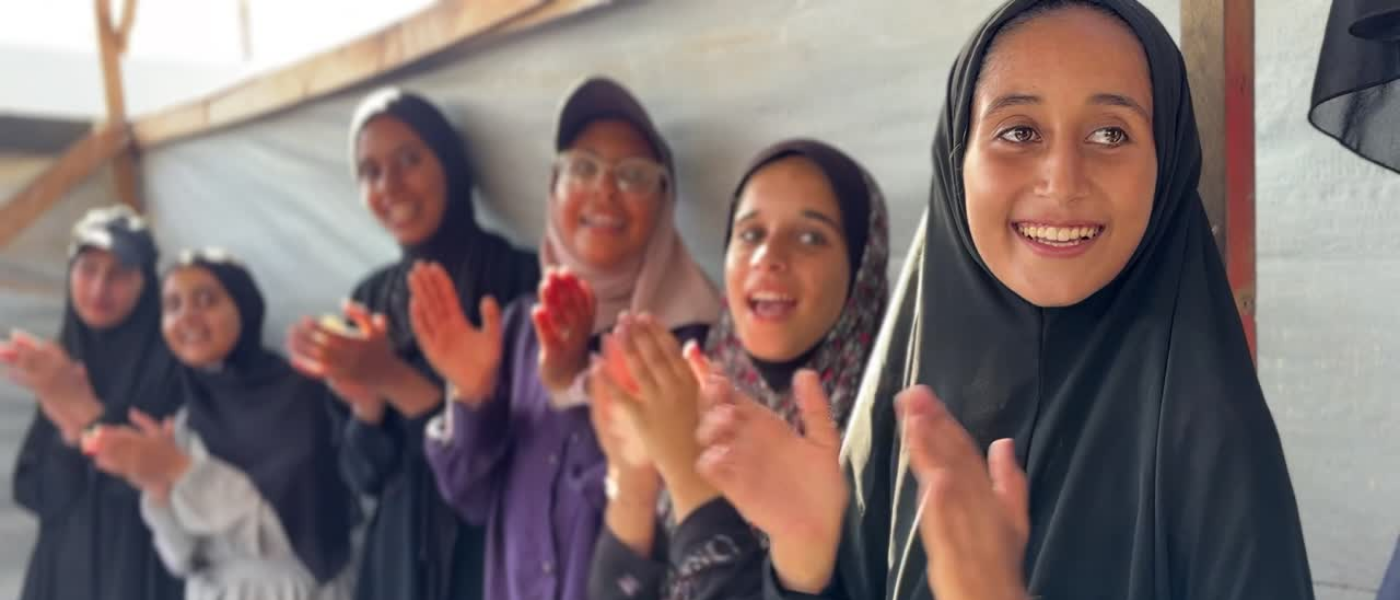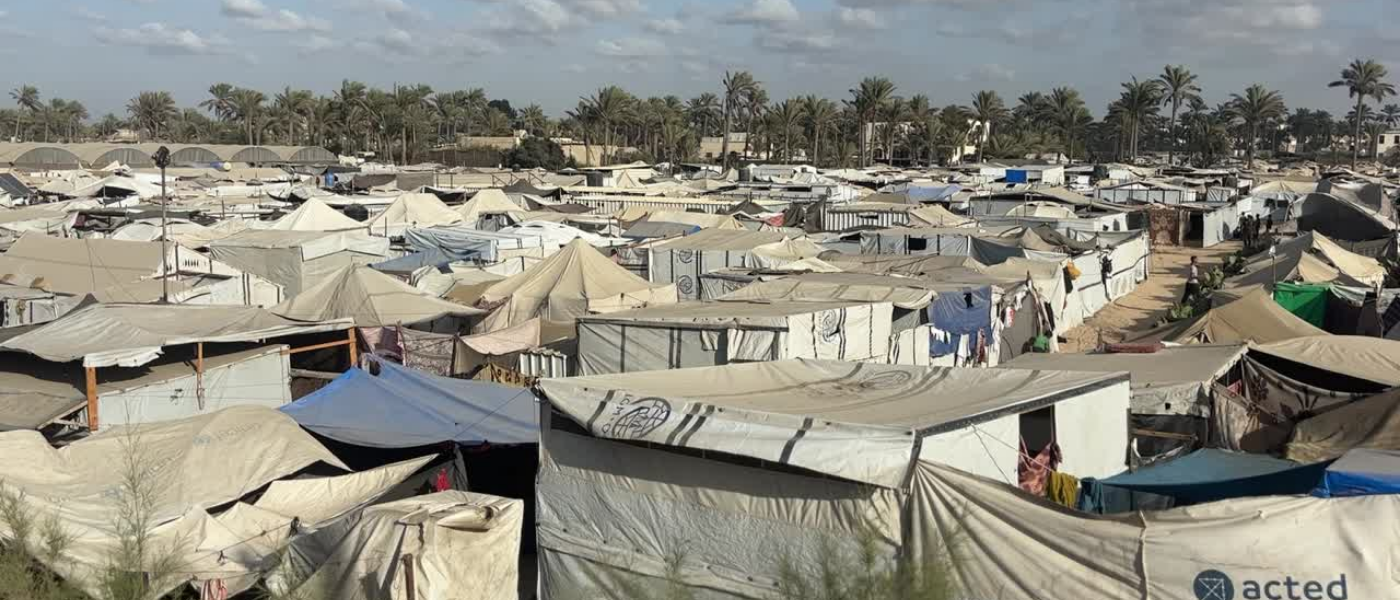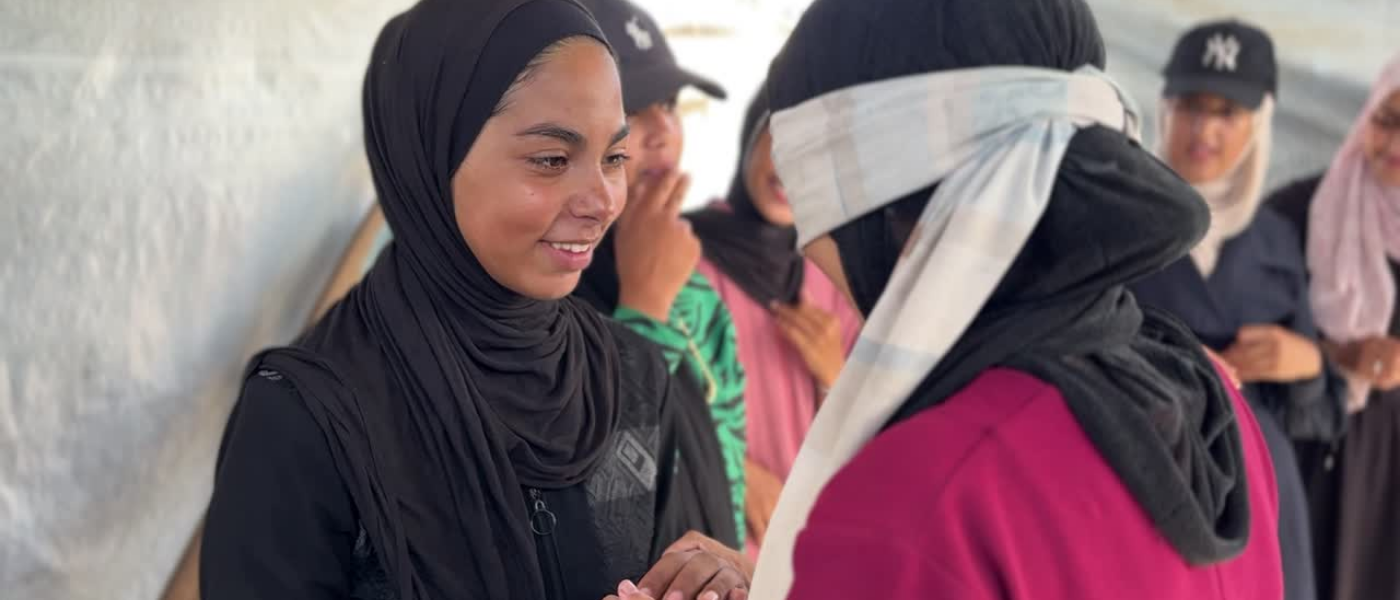Bringing mental health support to girls and young women in Gaza
In April 2025, Free to Run launched our Al Amal program in Gaza in partnership with Palestine Sports for Life. Al Amal means “hope” in Arabic. The goal of this program is to support adolescent girls and young women in Gaza to improve their mental health with a focus on resilience, in light of the violence and complex trauma they are experiencing in the current war and occupation.
So far, early sessions have already reached more than 100 girls and young women. The program is focused on the most profoundly impacted communities of Deir al-Balah, Khan Younis, and Gaza City, where many participants are living in temporary tents.
“Yoga helped me feel like I have a space just for me, even if everything around me feels unstable. After every session, I felt lighter.”
The context: conflict and mental health
The current crisis in Gaza follows decades of violence and human rights violations. Rates of depression, anxiety, and post-traumatic stress disorder have been reported to be as high as 70 percent among Palestinians. Since October 2023, the situation has worsened dramatically, with a collapsing healthcare system, repeated displacement, and a scarcity of food, clean water, and medicine.
We know that conflict disproportionately restricts the rights of women and girls. In Gaza, these barriers are heightened by mobility restrictions and gender norms and adolescent girls are among the least likely to access mental health services due to stigma. Al Amal seeks to address this gap by offering dedicated mental health support at a critical time in their development.
How the program works
The program is a six-month cycle with two 60-90 minute sessions each week, led by trained young women facilitators in safe spaces. Each session combines movement such as yoga or strength training with a mental health focus, such as self-regulation, anxiety reduction, or identifying and coping with stressors.
Al Amal builds on Free to Run’s Omid program in Afghanistan, which has provided secret, trauma-informed movement sessions for young women living under Taliban rule since 2021. Omid has shown measurable improvements in mental health and resilience for participants, and we adapted and translated the curriculum to meet the realities of the current context in Gaza.
Why sport matters for resilience
Physical activity is known to produce biological responses in the body such as serotonin, dopamine, and beta endorphins, which reduce levels of depression and anxiety. The social experience and personal challenge involved in movement and exercise also contribute to increased self-confidence.
This approach, sometimes referred to as “psychosomatic resilience”, combines physical activity with mental health practices like breathing and reflection to help adolescent girls and young women cope with stress, manage emotions, and strengthen both their bodies and their minds.
“In Gaza, the Al Amal program gives young women practical ways to manage extreme levels of stress and gain a sense of control in their lives, even when their freedom and rights are so limited. We get questions about whether or not a program like this is really critical in an active war zone. It absolutely is necessary for girls and young women to process their own pain and experience in Gaza today, not just when this war is over.””
Since its launch, Al Amal has faced repeated disruptions from displacement, lack of internet access, and security concerns. At times, activities have been paused to protect the safety of trainers and participants. Phone-based communication has been used as an alternative where possible.
Despite these severe challenges, Free to Run is committed to supporting the young women in Gaza as long as it is safe to do so, and participants and their families have reported improvements in well-being. One mother said that her daughter, previously unable to speak due to trauma, was beginning to interact with her family after several sessions in the program.
“Despite the instability, our trainers have been able to reach participants with practical tools to reduce stress and build resilience. The feedback from girls and their families confirms the importance of continuing this work whenever and wherever it is possible to do so.”
The program’s impact
The program’s impact is being measured through Free to Run’s robust monitoring and evaluation system, including baseline and endline surveys, focus group discussions, and interviews. Outcomes are assessed using the Adolescent Resilience Questionnaire, an internationally recognized scale for measuring resilience in adolescents. Baseline data has been collected, and so far shows that most participants are starting Al Amal with high levels of distress and very limited outlets to cope. Before the program:
74% of girls reported feeling nervous, anxious, or on edge several days or more in the past two weeks
75% said they were unable to stop or control worrying on several days or more
83% reported feeling down, depressed, or hopeless several days or more
78% experienced little interest or pleasure in doing things several days or more
On physical activity, 58% had never practiced yoga or movement prior to the program, and another 41% practiced only seldom or sometimes, underscoring the lack of opportunities for safe, structured physical activity in Gaza
The early impact of Al Amal demonstrates the extreme need and impact of safe spaces, movement, and mental health support in Gaza. We will continue to assess conditions on the ground and adapt program delivery to ensure adolescent girls and young women in Gaza can access the safe spaces and essential psychosocial support they need.
Supporting young women in Gaza
Support from our global community is critical to the the ongoing sustainability and growth of Al Amal. If you’d like to make a difference for young women and support our work in Gaza, you can do so by donating in any currency via the form below, or by exploring other ways to give at freetorun.org/ways-to-give. Thank you. ❤️














